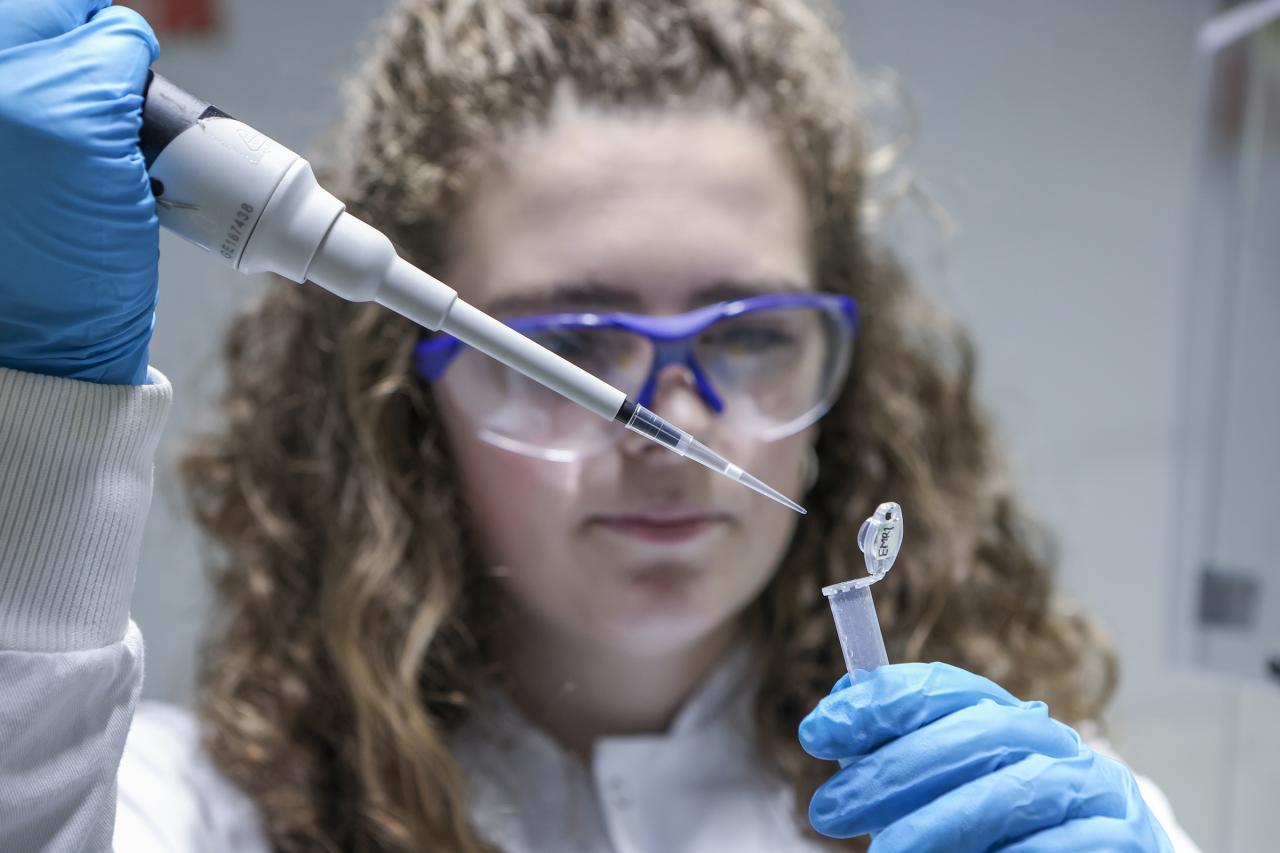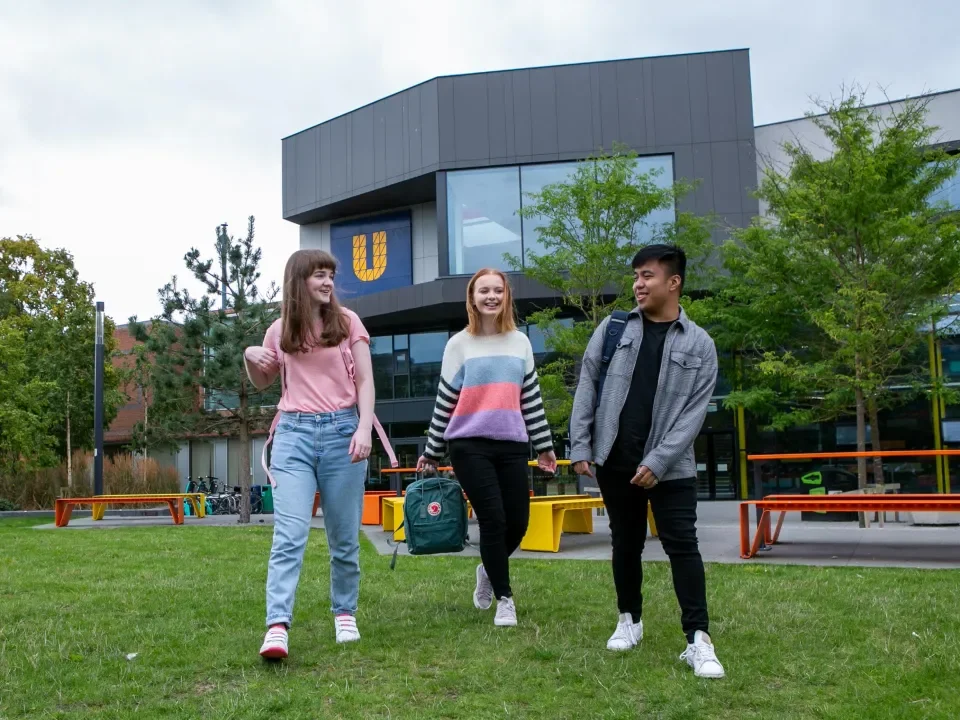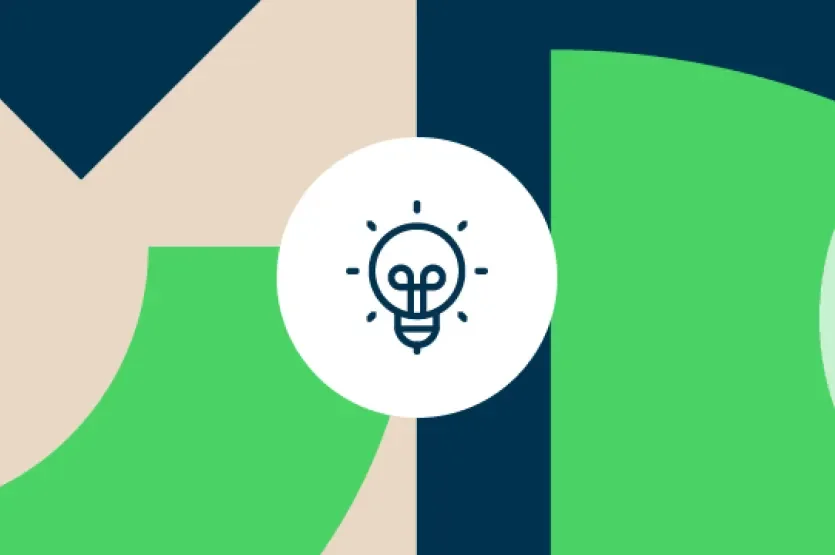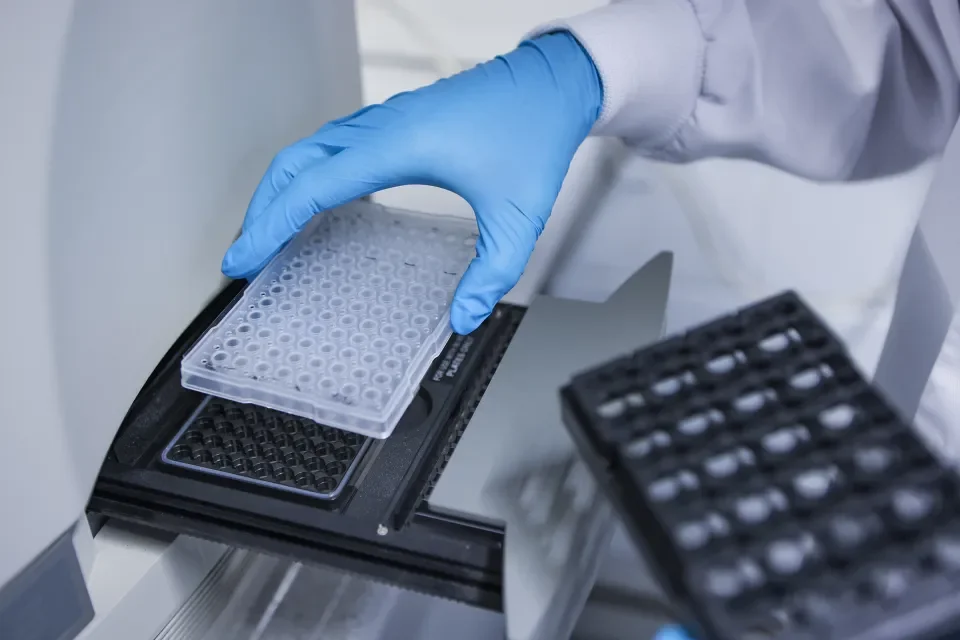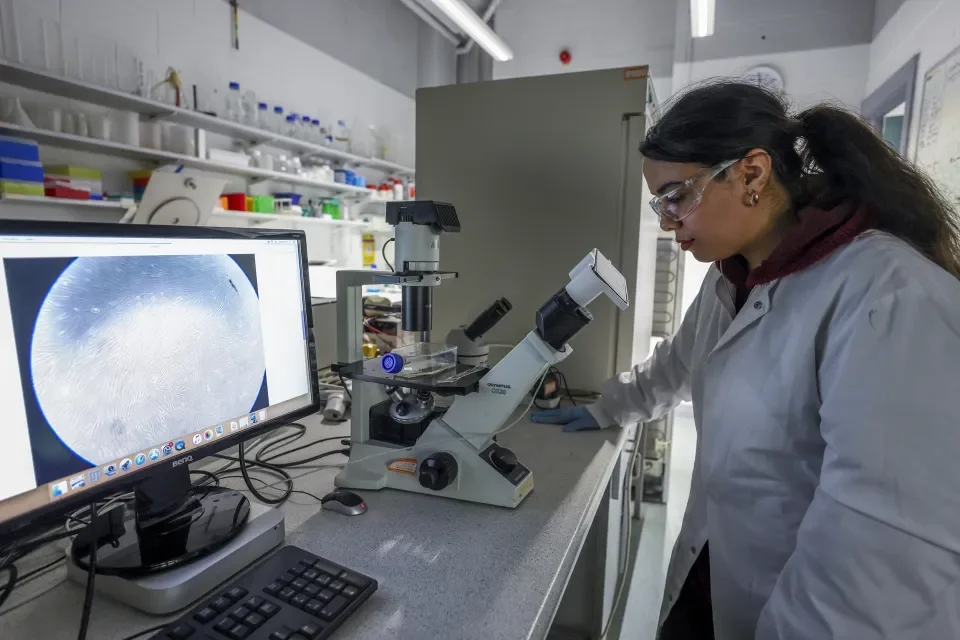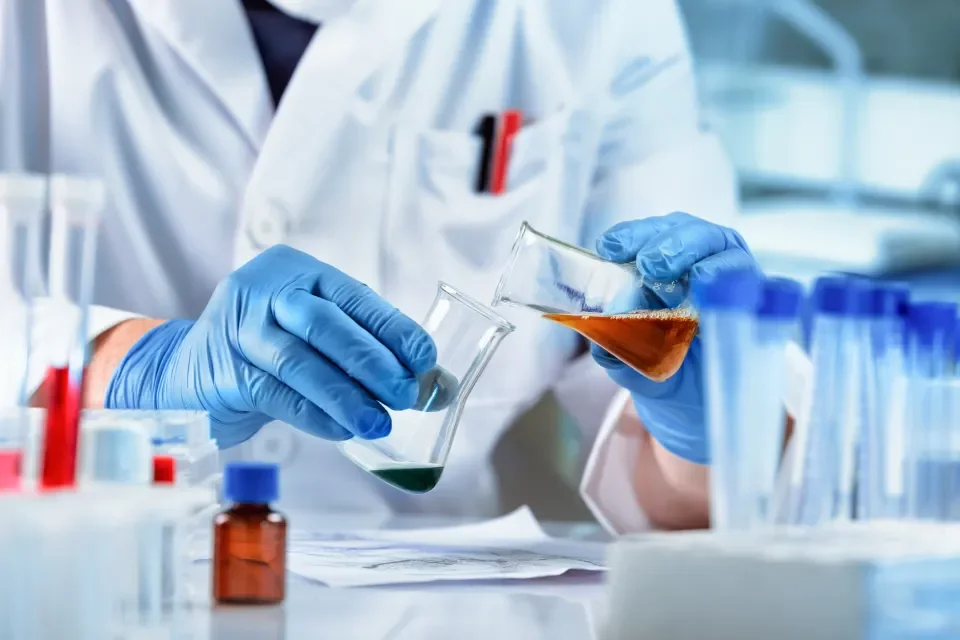Overview
By choosing this general entry course, you can discover more about molecules, cells and life, develop your scientific skills and discover different specialist study and career paths.
During the General Entry course, you’ll study biochemistry, bioprocessing, biotechnology, genetics, cell biology and microbiology, while also completing some modules in chemistry, physics and mathematics. Once you successfully pass this first year, you’ll go on to one of three programmes: the BSc in Genetics and Cell Biology, the BSc in Biotechnology or the BSc in Bioprocessing. While progression into year two of BSc in Biotechnology, BSc in Genetics and Cell Biology, BSc in Bioprocessing is available to all BGE students, year two programme places will be assigned to BGE students based on their year one grades (merit order). When places for year two programmes are limited, BGE year one students will be offered one of their year two programme choices.
Overall, our biological sciences modules are designed to help address challenges relevant to the biotechnology, biopharma and related industries. They incorporate innovative ways of teaching, and you’ll learn by tackling real-world challenges, both on your own and in groups.
Regardless of which programme you go onto, you’ll do a nine-month INTRA work placement in your third year. This is typically in Ireland's thriving biopharma industry, with employers such as Pfizer, Amgen, Biogen and MSD. Biological science grads find they are sought after as process scientists, validation engineers and quality control scientists, especially in the production of biological products, such as therapeutic drugs.
Why DCU
DCU People

I chose Biological Sciences General Entry as I knew that I wanted to study Science. I was so excited coming into this course.
Read more about Abbey Byrne
Careers & Further Options
Careers
Our graduates go on to a wide variety of rewarding careers, in areas outlined below
- Postgraduate Research (PhD) and Postdoctoral Research in the Biological Sciences
- Laboratory work in the Bioprocessing and Biopharma Industries
- Quality Management and Regulation in Biopharma Industries
- Bioprocess Engineering: bioprocess plant design and commissioning
- Technical Sales and Support
- Teaching
- Technical Roles in Food and and Beverage Production
- Brewing
DCU graduates are highly sought after by employers. Our Graduates work in environments ranging from large multinationals to SMEs, family businesses and start-ups across every sector.
DCU Careers Service has a number of learning and development initiatives in place for our students, giving them the skills they need for a successful career path.
Entry Requirements
In addition to the general entry requirements for admission to the university the following entry requirements apply
Minimum of O3 or H6 in Mathematics and minimum of O3 or H5 in one of Physics, Chemistry, Biology, Physics with Chemistry, Agricultural Science or Computer Science
In addition to the general entry requirements for admission to the university the following entry requirements apply
Minimum of O3 or H6 in Mathematics and minimum of O3 or H5 in one of Physics, Chemistry, Biology, Physics with Chemistry, Agricultural Science or Computer Science
In addition to the general entry requirements for admission to the university the following entry requirements apply
GCE A Level D or GCE AS Level C or GCSE B Mathematics and GCE A Level D or GCE AS Level C or GCSE B in one of Physics, Chemistry, Biology, Physics with Chemistry or Agricultural Science
GCE A Level general entry requirements can be found here: http://www.dcu.ie/registry/entry.shtml. Please note these may vary slightly for some programmes
Please visit our Admissions webpage for details on course requirements or how to apply to DCU.
Please visit our QQI FET webpage for details on DCU courses, open days, campus tours or school visits.
To apply to DCU, please visit www.cao.ie.
Mature entry is a competitive process. Applicants must demonstrate:
- a genuine interest in the programme(s) they are applying for
- academic experience and competency in their chosen field of study
- an ability to engage and succeed on the programme
All applicants must complete a statement of interest to be considered for the mature application route.
For further guidance on the mature application process please see the CAO Website
No Entry Path
International candidates are expected to have educational qualifications of a standard equivalent to those outlined above. In addition, where such candidates are non-native speakers of the English language they must satisfy the university of their competency in the English language. For further information on international applications click here.
Course Structure
- Chemistry, Biology and Physics Laboratories
- Chemistry
- Professional Skills for Scientists and Engineers
- Physics
- Cell Biology and Biochemistry
- Microbiology and Genetics
- Calculus and its Applications
- Introduction to Biotechnology and Bioprocessing
Years 2,3 and 4 will be the modules of your chosen degree choice - Upon successful completion of Year 1 of the degree, choices are:
Fees and Funding
Fees
How To Apply
Applicants presenting EU School Leaving/FETAC Level 5 examinations: Apply through the Central Applications Office (CAO) by 1st February or 1st May
To apply for this programme:
Candidates should apply directly here. Here's a quick step by step guide if you need help with your application.
Please provide
- Academic Transcripts for each and every year of study with English translation, if applicable.
- If applicable, provide evidence of competence in the English language as per DCU entry requirements.
Applications are accepted on an ongoing basis up to 1st July. All Non-EU candidates are advised to apply early, as places are limited.
All mature applicants apply through the CAO by 1st February. For further information and for special application procedures for mature students, please click here
Please see Application Procedures or E-mail ugadmissions@dcu.ie.
Candidates required to apply through the CAO can apply online at www.cao.ie
Life On Campus
At DCU, our students can expect a unique campus experience. We are known for our excellent teaching and learning facilities, our active clubs and societies, and our great social and sporting facilities. All this makes DCU an exciting place to be.
DCU has three academic campuses; Glasnevin, St. Patrick’s and All Hallows (both in Drumcondra), all close to Dublin City centre.
They can be reached by public transport, Dublin Bus and Bus Éireann, with our Drumcondra campuses a ten minute walk from Drumcondra Train Station. Glasnevin is a 20 minute walk from St Patrick’s and All Hallows. They are also linked by Dublin Bus.
Each campus has a library (O’Reilly, Cregan and Woodlock Hall), study spaces, restaurants, and on-campus residencies. There are sports facilities on Glasnevin and St. Patrick’s, and there is a dedicated sports campus, St Claire’s, located near Glasnevin on the Ballymun Road.
DCU’s 19,000 students have access to exceptional teaching and learning facilities across our three academic campuses.
These include modern learning theatres, research centres, a new media and TV studio, radio/podcast studios, computer suites and advanced labs in the areas of Languages, Engineering, Physics, Chemistry and Biotechnology, as well as a Sports Performance centre and a training hospital ward. In 2021, we opened our first virtual reality ‘Leadership Lab’, which is located in our Business School.
We continue to improve and update our facilities. For example, construction of a new world-class STEM facility is underway on the Glasnevin campus. With capacity for an extra 3,000 STEM students, this facility will advance DCU’s international reputation for excellence in science and health, computing and engineering disciplines.
Studying in DCU isn’t just about course work. The university is rich in student life and activities.
There are more than 140 clubs and societies for students in DCU, with ‘Clubs & Socs’ days taking place on both the Glasnevin and Drumcondra campuses at the start of the academic year. They span everything from rugby to rock climbing, anime to jazz.
For many students, sport is an important part of the DCU experience. DCU’s Sports Complex boasts a 25 metre swimming pool, fitness centre gym, all-weather pitches and squash courts, as well as soccer, GAA and rugby pitches. DCU Dóchas Éireann, the university’s GAA club, is the largest third level Gaelic Games club in the country. Meanwhile, DCU Athletics has been Ireland’s highest achieving university club for many years. And DCU has dozens of other clubs to get involved in, from Archery to Weightlifting.
The Glasnevin campus is home to our purpose built, state-of-the-art student centre, The U, which serves the needs of a rapidly growing student body. Here, you will find the Student Leadership and Lifeskills Centre, performing arts and cultural spaces for students and the wider community, and the Entrepreneurship and Innovation Hub. Also located on our Glasnevin campus is The Helix, our renowned performing arts centre.
On our St Patrick’s campus, we have the Java Student Hub, a vibrant, warm and welcoming space where students can meet for coffee, play music, use the projector to watch events, or just relax. The walls of the Java Hub were designed based on the cultural history of St Patrick’s Campus, including the special references to the notable sporting history and history of the arts.
We have a number of academic, professional and social supports for students.
Student Advice & Learning Skills Centre - Offers a wide range of supports and services to students and advice
The Writing Centre - drop-in writing workshops for students through the academic year
Maths Learning Centre - provides maths support for students of all ability levels with maths modules
Student Learning - facilitate the transition from passive to active learning for students at DCU, by teaching study skills, nurturing critical thinking and building student confidence.
Careers work with students to help them on their professional journey into graduate employment.
Our student support team offers a comprehensive support programme, helping students make that all important transition into university life and focusing on building confidence and skills which are key to success at third level.

DCU Glasnevin Campus
FAQs
Is DCU all one campus?
DCU is a multi campus university - the Glasnevin, St Patrick's and All Hallows campuses. The St Patrick's campus is where the Education courses are taught and some of the subjects from the BA Joint Honours degree. There is a 20-25 minute walk between the campuses but there are buses and bikes available to go between them also.
Click here to see maps of all of our campuses
If I'm studying on the St Patrick's campus, can I use the library and sports centre on the Glasnevin campus?
Yes, all facilities such as sports and accommodation are open for all DCU students to avail of.
Are there libraries in DCU and if they have wifi and work stations?
We have a brand new state of the art four floor library on our St. Patrick's Campus which complements the existing library on the Glasnevin campus. There is free wifi, work stations as well as desktop computers.
Does DCU provide accommodation?
DCU does have on-campus accommodation for undergraduate and postgraduate students, and you can find out more and apply via the Accommodation Office webpage.

